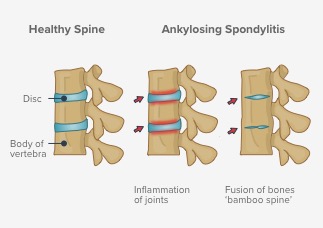Ankylosing Spondylitis
What Is Spondylosis?
There is no cure for ankylosing spondylitis, but non-surgical and surgical treatments can reduce the severity of your symptoms and help slow the progression of the disease.

Causes
The condition primarily affects men. Two to three times more men than women develop the disease. The age of disease onset is usually between 17 to 35 years old.
Symptoms
The symptoms of ankylosing spondylitis vary greatly from patient to patient. Almost all cases are characterized by painful episodes known as flares, which are followed by periods of remission when symptoms subside. The symptoms typically appear in early adulthood, but they can also present later in life or in childhood. The most common early symptoms of ankylosing spondylitis are:
- Chronic pain and stiffness in the lower back, buttocks and hips (usually develops slowly over several weeks or months)
- Pain and stiffness that worsens during periods of rest or inactivity and improves with movement and exercise
- Back pain during the night or early morning
- Feeling very stiff in the morning
Other common symptoms may include:
- Dull pain in the lower back that gradually appears over weeks or months
- Mild fever
- Loss of appetite
- General discomfort
- Anemia
- Difficulty breathing
- Hunched back
- Joint pain
Over time, symptoms might worsen, improve or stop at irregular intervals.
Follow Us
Request An Appointment
Address: 3273 Claremont Way, Ste. 201, Napa, CA 94558
Phone: 707-603-1042
